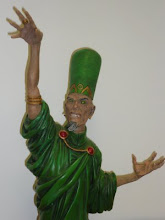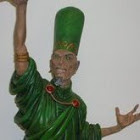 A deeply engaging, charming and thoroughly unsentimental book about farming cattle. Rosumund Young and her family run Kite's Nest Farm on the edge of the Cotswolds escarpment. It is a commercial enterprise, the animals on the farm are raised for food. The farm is managed using a very simple idea, that animals are sentient beings who flourish in freedom and proper attention. Animals raised like this produce better tasting beef or pork or chicken which is economically sustainable and rewarding. Based on her close up experience of rearing farm animals Rosamund Young takes aim at factory farming of animals on ethical and economic grounds and makes a very persuasive case.
A deeply engaging, charming and thoroughly unsentimental book about farming cattle. Rosumund Young and her family run Kite's Nest Farm on the edge of the Cotswolds escarpment. It is a commercial enterprise, the animals on the farm are raised for food. The farm is managed using a very simple idea, that animals are sentient beings who flourish in freedom and proper attention. Animals raised like this produce better tasting beef or pork or chicken which is economically sustainable and rewarding. Based on her close up experience of rearing farm animals Rosamund Young takes aim at factory farming of animals on ethical and economic grounds and makes a very persuasive case.Her main focus is on cows, pretty much the archetypal dumb beast, standing chewing a cud in a field, they are the picture of vacancy on legs. Without sufficient variety to stimulate them any sentient creature will be reduce to the minimum required to cope with very limited circumstances. They will shrink to fit, given access to water, shelter and food the same creature will expand to fit the circumstances. Rosamund Young writes form her observations of how widely cows will expand to fill the available space, respond to trust and careful attention.
Cows are herd animals, they communicate strongly with each other and anyone who interacts with them if they are willing to be communicated with. Anthropomorphism generally gets a bad name as a sentimental ruse to try and communicate with animals, bridging the gap by ascribing human attributes to animals. As anyone who has had prolonged contact with an animal,domestic or farm, will know that animals have individual characters, preferences and vividly expressed and felt emotions. This is not imposing a human facade on an animal, it is the exact opposite, it is observing them on their own terms. This is what Rosamund Young does and she writes about these observations with sparking wit and a deep appreciation for the animals.
She writes about the ways they respond to living, interacting with their own and with humans. The cows are named individuals because they are clearly individuals and it would be wildly insulting to treat them as anything else. The writing is never twee or cute, the fact that the background is commercial farming makes a considerable difference. There are no gentlewoman farming rearing pets in the guise of farming. This is straightforward observation based on close and continuous contact driven by the desire to produce better beef as cost effectively as possible.
Rosamund Young points out that they made a deliberate choice to stop being a dairy farm and concentrate on beef and this is fundamental to how the cows are managed. If the product is not milk it gives the cattle a very different life path and avoids operational and commercial problems that dairy production bring with it. The fact that these problems provide a very convenient cover for the agriculture industry to not directly engage with the concerns and ideas that are raised in the book is illustrated by a simple thought experiment. When reading the book replace the word cows with the word staff, the effect for anyone who has ever read anything about employee engagement is depressing. Units of farm production or units of headcount the view from the governing spredsheet is the same, cattle farm or cube farm it makes no difference.
The Secret Life of Cows is a pleasure to read, Rosanund has a great series of stories to tell and tells them wonderfully well.


No comments:
Post a Comment